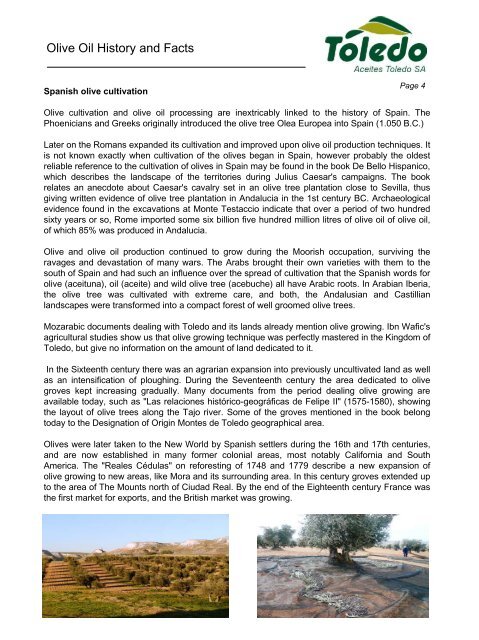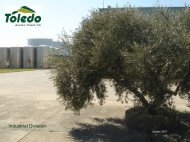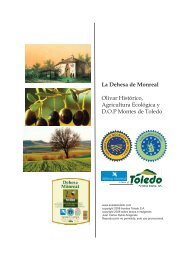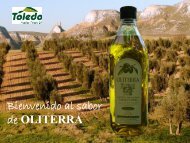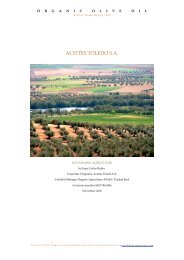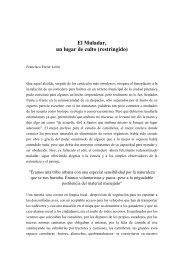On Olive Oil History and Facts. - Aceites Toledo SA
On Olive Oil History and Facts. - Aceites Toledo SA
On Olive Oil History and Facts. - Aceites Toledo SA
Create successful ePaper yourself
Turn your PDF publications into a flip-book with our unique Google optimized e-Paper software.
<strong>Olive</strong> <strong>Oil</strong> <strong>History</strong> <strong>and</strong> <strong>Facts</strong><br />
Spanish olive cultivation<br />
Page 4<br />
<strong>Olive</strong> cultivation <strong>and</strong> olive oil processing are inextricably linked to the history of Spain. The<br />
Phoenicians <strong>and</strong> Greeks originally introduced the olive tree Olea Europea into Spain (1.050 B.C.)<br />
Later on the Romans exp<strong>and</strong>ed its cultivation <strong>and</strong> improved upon olive oil production techniques. It<br />
is not known exactly when cultivation of the olives began in Spain, however probably the oldest<br />
reliable reference to the cultivation of olives in Spain may be found in the book De Bello Hispanico,<br />
which describes the l<strong>and</strong>scape of the territories during Julius Caesar's campaigns. The book<br />
relates an anecdote about Caesar's cavalry set in an olive tree plantation close to Sevilla, thus<br />
giving written evidence of olive tree plantation in Andalucia in the 1st century BC. Archaeological<br />
evidence found in the excavations at Monte Testaccio indicate that over a period of two hundred<br />
sixty years or so, Rome imported some six billion five hundred million litres of olive oil of olive oil,<br />
of which 85% was produced in Andalucia.<br />
<strong>Olive</strong> <strong>and</strong> olive oil production continued to grow during the Moorish occupation, surviving the<br />
ravages <strong>and</strong> devastation of many wars. The Arabs brought their own varieties with them to the<br />
south of Spain <strong>and</strong> had such an influence over the spread of cultivation that the Spanish words for<br />
olive (aceituna), oil (aceite) <strong>and</strong> wild olive tree (acebuche) all have Arabic roots. In Arabian Iberia,<br />
the olive tree was cultivated with extreme care, <strong>and</strong> both, the Andalusian <strong>and</strong> Castillian<br />
l<strong>and</strong>scapes were transformed into a compact forest of well groomed olive trees.<br />
Mozarabic documents dealing with <strong>Toledo</strong> <strong>and</strong> its l<strong>and</strong>s already mention olive growing. Ibn Wafic's<br />
agricultural studies show us that olive growing technique was perfectly mastered in the Kingdom of<br />
<strong>Toledo</strong>, but give no information on the amount of l<strong>and</strong> dedicated to it.<br />
In the Sixteenth century there was an agrarian expansion into previously uncultivated l<strong>and</strong> as well<br />
as an intensification of ploughing. During the Seventeenth century the area dedicated to olive<br />
groves kept increasing gradually. Many documents from the period dealing olive growing are<br />
available today, such as "Las relaciones histórico-geográficas de Felipe II" (1575-1580), showing<br />
the layout of olive trees along the Tajo river. Some of the groves mentioned in the book belong<br />
today to the Designation of Origin Montes de <strong>Toledo</strong> geographical area.<br />
<strong>Olive</strong>s were later taken to the New World by Spanish settlers during the 16th <strong>and</strong> 17th centuries,<br />
<strong>and</strong> are now established in many former colonial areas, most notably California <strong>and</strong> South<br />
America. The "Reales Cédulas" on reforesting of 1748 <strong>and</strong> 1779 describe a new expansion of<br />
olive growing to new areas, like Mora <strong>and</strong> its surrounding area. In this century groves extended up<br />
to the area of The Mounts north of Ciudad Real. By the end of the Eighteenth century France was<br />
the first market for exports, <strong>and</strong> the British market was growing.


